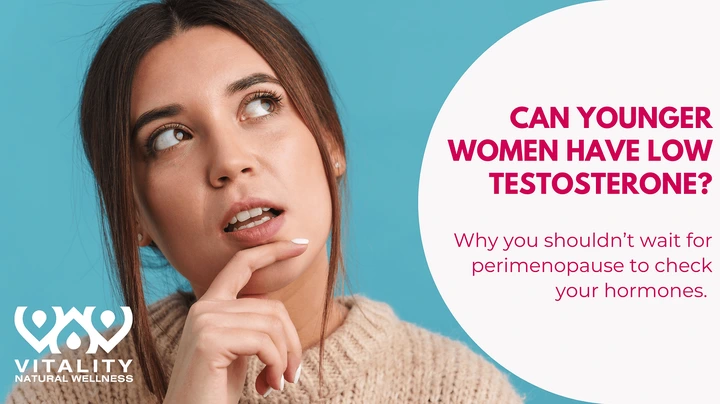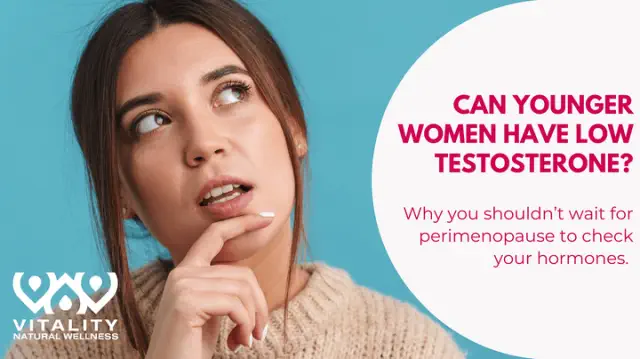
View pictures in App save up to 80% data.
This article was originally published here and re-posted to Richland Source with permission.
Did you know that low testosterone is fairly common in women in their 20s & 30s who have not yet reached perimenopause? So many factors contribute to testosterone level fluctuations, but women with low T often fly under the radar until they reach perimenopause or menopause, when hormones become a regular part of the wellness conversation. Keep reading to learn to recognize the signs and causes of low testosterone in younger women.
Signs of Low Testosterone in Women:
- Low Libido – Reduced sexual desire is one of the most noticeable signs, as testosterone influences sexual drive.
- Fatigue – Persistent feelings of tiredness or low energy, even after adequate sleep.
- Decreased Muscle Mass and Strength – Difficulty building or maintaining muscle, along with a possible increase in body fat despite exercise.
- Mood Changes – Mood swings, irritability, or feeling more anxious or depressed than usual. Testosterone helps stabilize mood.
- Brain Fog or Difficulty Concentrating – A lack of mental clarity, difficulty focusing, or forgetfulness.
- Reduced Bone Density – Though more common later in life, low testosterone can affect bone health, potentially leading to weakened bones and higher risk of fractures.
- Decreased Motivation and Drive – Lower overall motivation, including reduced enthusiasm for work, exercise, or social activities.
What Factors Contribute to Lower Testosterone Levels in Women of This Age Group?
- Chronic Stress
- High stress levels trigger the release of cortisol, a hormone that can inhibit testosterone production. Work pressure, family obligations, or emotional stress can deplete testosterone over time.
- Overtraining or Intense Exercise
- Excessive exercise without proper recovery can lead to hormonal imbalances, including reduced testosterone levels, especially in women who are highly active or engaged in intense physical training.
- Poor Diet or Nutrient Deficiencies
- Low-fat diets, in particular, can lower testosterone because fats (especially healthy fats like omega-3s) are crucial for hormone production. Deficiencies in zinc, magnesium, and vitamin D can also contribute to low testosterone.
- Hormonal Birth Control
- Some hormonal contraceptives (like the pill) can suppress the body’s natural production of testosterone. Oral contraceptives are particularly known to lower testosterone levels. This is compounded by the fact that oral contraceptives lower serum levels of zinc.
- Sleep Issues
- Lack of sleep or poor-quality sleep can negatively affect testosterone production, which occurs primarily during deep sleep cycles.
- Thyroid Dysfunction
- Thyroid hormone imbalances (hypothyroidism) can lower testosterone levels. Women with thyroid issues may experience overlapping symptoms such as fatigue, weight gain, and mood disturbances.
- PCOS (Polycystic Ovary Syndrome)
- While PCOS is usually associated with high testosterone, some women may experience low testosterone, especially after years of hormone fluctuation.
- Adrenal Fatigue
- Chronic stress and high cortisol levels can lead to adrenal fatigue, where the adrenal glands (which help produce testosterone) become depleted, contributing to low testosterone.
Due to the fact that testosterone levels in women are inherently lower than those in men, there tends to be less recognition and clinical emphasis on identifying and addressing low testosterone in females. Additionally, the typical ranges considered “normal” for testosterone in women fluctuate significantly, complicating both diagnosis and the assessment of prevalence.
Despite these challenges, at Vitality we often encounter women with symptoms of low testosterone who benefit from lifestyle changes or hormone support. We hope this article has armed you with information that will help you to better advocate for your own healthcare. If you’re concerned about testosterone deficiency, call us today to get started on tackling your hormones together!










